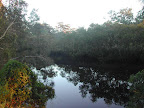Where on Earth is Psychology?
Thich Naht Hanh
I have found my calling.
I have been reading an excellent paper delivered by John Seed to the Ecological Symposium at the Australian Psychological Society's 28th Annual Conference in the Gold Coast, QLD, 1994
http://www.rainforestinfo.org.au/deep-eco/seed.htm
As a community psychologist, I concur with the idea that wellbeing cannot be acheived through the application of treatment to individuals. Health happens through the interaction between individual characteristics, their relationships with others, and societal factors such as government policies relating to education and employment.
To a limited extent, the model for wellbeing that is central to Community Psychology also accounts for non-human elicited environmental factors such as housing, pollution levels, access to open and natural spaces and so on. We even have a phrase for this - the "built environment". However, in my current educational experiences, this concept is treated as a sub-section of interest rather than an intergral part of the overall model. Furthermore, the natural environment is certainly not given sufficient emphasis.
I found that John Seed's paper expressed my own frustration at the limitations of dominant paradigms of psychology to adequately incorporate both the natural and non-natural environments in their conceptualisation of wellbeing. In fairness, these paradigms were destined to be so-limited, given that the discipline has striven for many a year to justify itself as a "hard" or "real" science, with cause and effect-type laws. Psychology has focused on reducing the experiences or behaviours of numerous individuals to generic templates that can thus be affixed to any individual to explain some mental and/or behavioural state. The way this has been done in the past is to look at the indicator - the presenting symptom, the 'thing' inside the person, and to examine it into a statistical model of prediction.
When we are so engrossed by the individual, there is naturally no room for external or mitigating factors such as the environment or society.
My question has long been HOW CAN WE BE SO BLIND????
At first I could not understand how we could hope to acheive wellbeing in individuals when we gave them individualised support that would be torn down by the environmental factors that regaled the subjects of our care daily, such as criticism from loved ones, temptation or goading from friends, and so on.
This is what attracted me to Community Psychology. It looks at the bigger picture. However, as I have said, we still miss the fact that people everywhere are utterly disconnected from the natural environment. The CP wellbeing model still places individuals at the centre.
As John Seed states, we are not at the centre of the model, nor at the top of the chain, we are part of the web. It is only when we are able to understand that the Earth has a right to heave a tsunami over any bit of land it likes, populated or not, that a hurricane/cyclone will sweep across a town or a body of water as it chooses, that sharks are allowed to swim in the ocean and bite things that they think are food - including people, that we will begin to acheive wellbeing.
We must re-learn humility and respect for our world.
Indigenous people in Australia are commonly afflicted by 'mourning for country', such is their deep spiritual connection with the land. They have oft been berated as an unsophisticated people who required modernisation when Europeans started to interfere with and colonise Australia. Yet, through their respect for, and understanding of the Australian ecosystem, they have survived in the harsh Australian climate and are are one of the oldest native peoples on Earth.
At the extreme risk of sounding horrendously corny, this notion of the Earth as our mother resonates with me. Indeed 'she' (in keeping with the preceding allegory) provides us with nourishment through plants, animals, and meteorological by-products like rain and sunlight. We are beholden to these endowments - proven by the fact that we can not sustain in environments where these elements are out of balance or absent (e.g., on the moon).
The Indigenous peoples of Australia got it right a long time ago, we all should experience 'crying for country' - now even more so as the effects of our destruction are increasingly evident. Indeed, I believe many of the current psychological problems humans face can be sourced (and thereby addressed) through the disconnect between people and their world. Whilst we continue to fight against nature instead of accepting it as part of our place within the web, we are destined to create unhappiness and destruction within ourselves, as well as between each other and non-human parts of the ecology.
I believe we only have limited tenure as the dominant species in this world - a tenure we are hell-bent on minimising according to our current mentality - but I want to take part in the change movement, the movement toward compassion and togetherness, and a global understanding of and respect for the great web (not the HEIRARCHY) of life.
This is health-creation, this is my calling, this is the only way to a future for us all.


